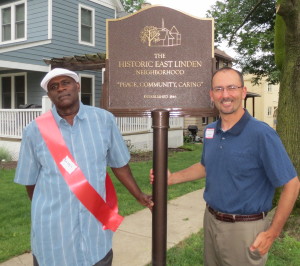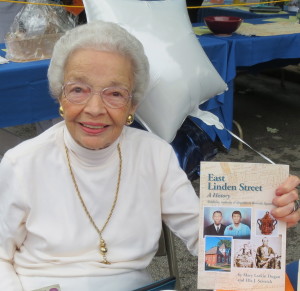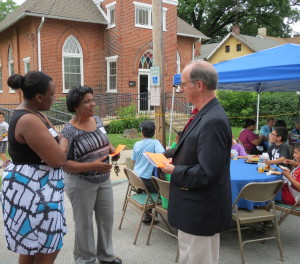Community celebrates its diversity, dedicates new bronze plaque
By Kathleen Brady Shea, Managing Editor, The Times

Historic East Linden Street Project board member Barry “Hap” London (from left) shows off the neighborhood’s new plaque with Kennett Square Borough Council President Dan Maffei.
At one East Linden Street home – a former ceramics studio – abolitionists used large, lidded pots to transport slaves to other stops along the Underground Railroad. A beloved doctor’s residence temporarily lost its roof in the mid-20th century so that an oversized freezer could be lowered inside to accommodate the common payments made to Dr. Orville R. Walls: chickens.
Such rich history greeted residents and supporters of the Historic East Linden Project during a tour led by board member Ethan Cramer on Saturday at the annual Community Gala, a block-style, community gathering and breakfast. “This is an incredibly beautiful neighborhood that contains a diverse mix of historic and newer homes,” said Cramer. “You very rarely find those together.”
Indeed, the combination of styles from a variety of eras – a distinction echoed by Dennis Melton, a local architect – was just one of many reasons to celebrate. Despite its treasured past, the neighborhood fell prey to crime and poverty until a group of determined supporters united in 2004 and reversed the decline.
Theresa Bass, who has lived on the street for more than four decades, and Joan Holliday, a public nurse who worked in the neighborhood, orchestrated a comeback that continues to gain momentum through the Historic East Linden Project, Inc., a 501c3 that runs a number of popular programs such as “Study Buddies” for schoolchildren.
Cramer said the after-school program, which started with eight to 12 children more than a decade ago, had 20 to 25 participants last month. Operated by staff instructor Katie Perigo and a host of volunteers – ranging from Kennett Square police officers to high school students – the three-day-a-week program includes homework help, tutoring, academic enrichment, and dinner. “We’re very proud of that program,” Cramer said.
Another point of pride: Many present borough residents are descendants of the distinguished group responsible for creating the East Linden Street neighborhood. “It was designed to offer affordable housing,” Cramer said.
Saturday’s festivities also offered a fond tribute to the late Mary Larkin Dugan, a teacher, writer and historian known as the driving force behind the Kennett Underground Railroad Center and as an advocate for East Linden Street. Dugan and Ella J. Sestrich, who attended Saturday’s event, authored East Linden Street: A History, an effort to share “the colorful history of this old community, which has been and is still a vital part of town.”

Ella J. Sestrich displays the book she co-authored with the late Mary Larkin Dugan, an advocate of the East Linden Street Project who was honored at the gala.
Bass said she is pleased with the progress the neighborhood has experienced but mindful that there’s always more to do. “We know this: Our neighborhood, our borough, our county and even our country is something we share,” she wrote in the gala’s program. “We need to stick together because otherwise things fall apart.”
Today, yards that once served as frequent arrest sites are framed by manicured gardens and hanging baskets. The historic homes are marked with plaques that showcase their history. And on Saturday, another, larger plaque was unveiled by Kennett Square Mayor Matt Fetick and a host of dignitaries.
The bronze neighborhood identifier contains the words “Peace, Community, Caring,” words that encapsulate the philosophy that has fueled the renaissance. Board member Barry “Hap” London smiled as he surveyed the neighborhood’s latest addition.
“It looks really, really great,” agreed Kennett Square Borough Council President Dan Maffei.





